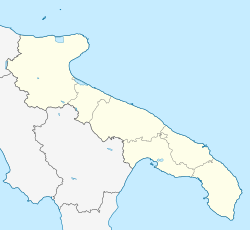Maglie
Maglie
Griko: Μάλιαι/Maje | |
|---|---|
| Città di Maglie | |
 Piazza Aldo Moro | |
| Coordinates: 40°7′N 18°8′E / 40.117°N 18.133°E | |
| Country | Italy |
| Region | Apulia |
| Province | Lecce (LE) |
| Frazioni | Morigino |
| Government | |
| • Mayor | Ernesto Toma |
| Area | |
• Total | 22.66 km2 (8.75 sq mi) |
| Elevation | 81 m (266 ft) |
| Population (1 January 2018)[2] | |
• Total | 14,196 |
| • Density | 630/km2 (1,600/sq mi) |
| Demonym | Magliesi |
| Time zone | UTC+1 (CET) |
| • Summer (DST) | UTC+2 (CEST) |
| Postal code | 73024 |
| Dialing code | 0836 |
| Patron saint | St. Nicholas of Bari |
| Saint day | 9 May |
| Website | Official website |
Maglie (Salentino: Maje; Griko: Μάλιαι, translit. Màje; Template:Lang-la) is a town and comune in the province of Lecce in the Apulia region of south-east Italy.
History
The Maglie area was settled as early as the Bronze Age and the early Iron Age, and before, as testified by the presence of archaic dolmens and menhirs, and by the Cattìe site, discovered in 1980, and featuring 12,000 tools and 800 bone remains.
Maglie, initially a countryside casale, developed around the castle built in the 13th century, probably under the Angevine kings of Naples and later renewed by Andriolo Lubello, the local baron under king Alfonso I of Aragon.
Main sights
- Duomo (Cathedral, also called Chiesa Collegiata). It was built in the late 18th century on the site of two previous buildings tracing back to 14th and 16th century. Its bell tower (1686–90), standing at about 48 metres (157 ft), is the tallest in the province. The four upper storeys are attributed to Giuseppe Zimbalo.
- Church of Madonna delle Grazie, in Baroque style (early 16th century). The interior has a 1645 Baroque altar and 17th century canvasses. It also features a column, similar to the Lecce's Column of St. Oronzo by Zimbalo, built in 1684–87.
- Church of Madonna Addolorata (18th century)
- Palazzo Baronale
Economy
Maglie's economy is based on commerce, craftmanship (especially of local stone), and tourism.
Demographics
Population development since 1861:
| Year | Pop. | ±% |
|---|---|---|
| 1861 | 5,202 | — |
| 1871 | 5,750 | +10.5% |
| 1881 | 6,663 | +15.9% |
| 1901 | 8,664 | +30.0% |
| 1911 | 9,484 | +9.5% |
| 1921 | 11,047 | +16.5% |
| 1931 | 10,542 | −4.6% |
| 1936 | 11,279 | +7.0% |
| 1951 | 12,737 | +12.9% |
| 1961 | 13,028 | +2.3% |
| 1971 | 13,657 | +4.8% |
| 1981 | 15,198 | +11.3% |
| 1991 | 15,223 | +0.2% |
| 2001 | 15,255 | +0.2% |
| 2011 | 14,819 | −2.9% |
| 2020 | 13,893 | −6.2% |
| source:[3] | ||
Migrant communities in Maglie with more than ten people 01.01.2020:
| 127 | |
| 51 | |
| 21 | |
| 19 | |
| 16 | |
| 15 | |
| 15 | |
| 13 | |
| 12 | |
| 11 |
Transportation
Maglie is served by the Ferrovie Sud Est Zollino-Gagliano and Maglie-Otranto lines.
It is crossed by two state roads, the SS16 Adriatica Lecce-Maglie-Otranto, and the SS275 from Santa Maria di Leuca.
People
- Aldo Moro (1916-1978), politician
References
- ^ "Superficie di Comuni Province e Regioni italiane al 9 ottobre 2011". Italian National Institute of Statistics. Retrieved 16 March 2019.
- ^ "Popolazione Residente al 1° Gennaio 2018". Italian National Institute of Statistics. Retrieved 16 March 2019.
- ^ "Statistiche Istat".





